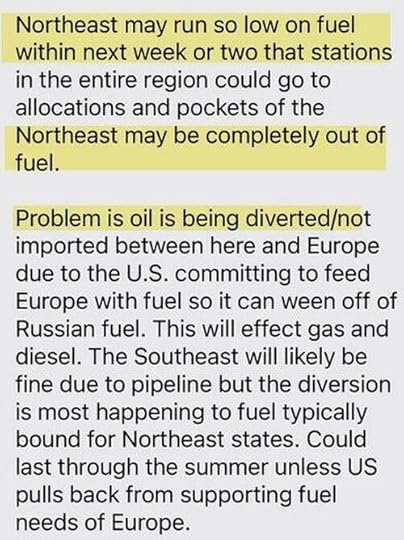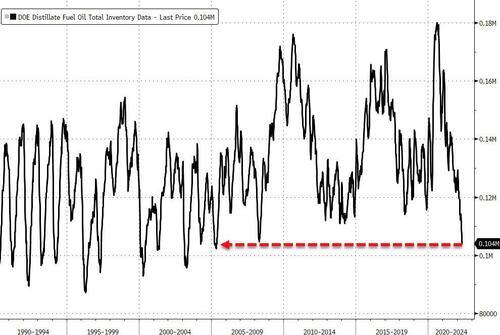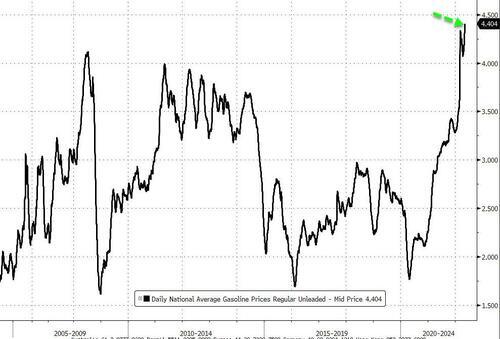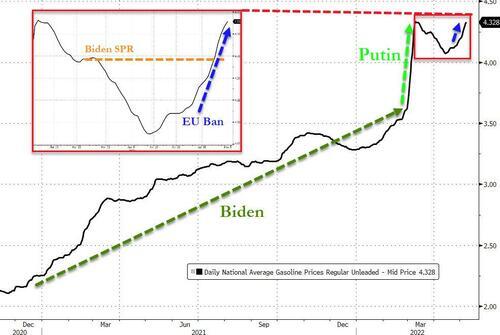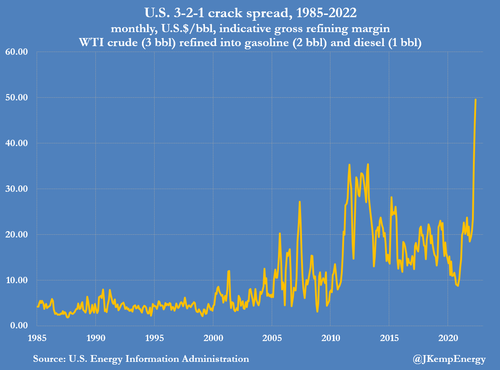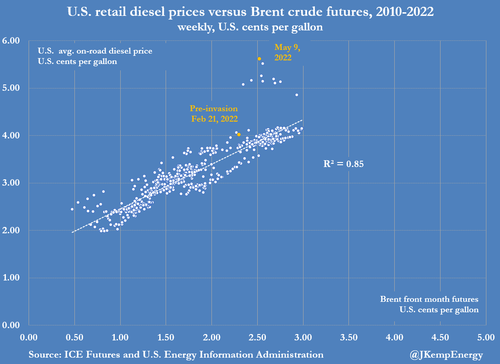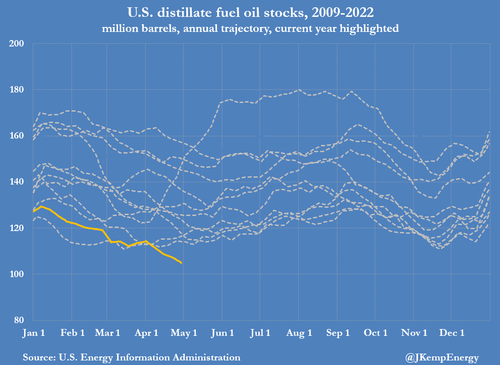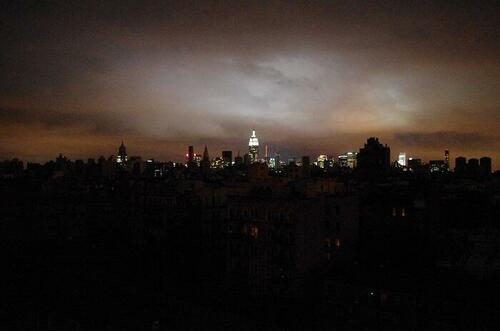Steve Bull's Blog, page 230
May 11, 2022
Major Trucking Firms Prepare For “Imminent Diesel Shortage In Eastern Half Of US”
Major trucking fleets across the eastern half of the US are preparing for an “imminent” diesel shortage, according to logistics firm FreightWaves.
Founder and CEO of FreightWaves Craig Fuller said “3 very large fleets” are preparing for diesel pumps at fuel stations to run dry. Drivers of these fleets received notifications about fuel shortages that could materialize in the coming weeks across the Mid-Atlantic and Northeast regions.
Fuller tweeted several messages that drivers received from fleet operators. The notifications were alarming.
He also tweeted what appears to be an unnamed industry insider explaining the historic mess hitting Mid-Atlantic and Northeast markets is a combination of crude being diverted from the US to Europe and supply chains issues along the East Coast.
Diesel supply is short worldwide due to the invasion of Ukraine disrupting energy markets and resulting Western sanctions. The writing has been on the wall for months about developing shortages, as we discussed in:
Global Diesel Shortage Raises Risk Of Even Greater Oil Price Spike“Gas Stations Will Run Dry”: Catastrophic Scenario For Diesel Emerging According To World’s Biggest Energy TradersD-Day Approaches: Crack Spread Soars As Diesel Market Braces For Historic ShockUS East Coast Diesel Stockpiles Hit Record Low As Fuel Crisis NearsWidespread US Diesel Shortages Send Crack Spreads To Mindblowing HighsOn Wednesday, DOE showed US diesel inventories are now 23% below the five-year average for this time of year, at their lowest since May 2005.
The situation isn’t improving as diesel prices at the pump soar to new highs.
Retail gas prices are also legging higher.
And who does President Biden blame this time for possible fuel shortages? Can’t keep blaming Putin for every problem.
Our Impending Impasse and Sid Smith’s New Series
 Keowee Toxaway State Park, South CarolinaI have a backlog of articles I have started but haven’t yet finished, so I’m starting with this one which has to do with our impending impasse. I think William Catton, Jr. worded that very well. It actually comes from his book, Bottleneck: Humanity’s Impending Impasse, in which a review is available here. For those unfamiliar with Catton, he wrote (among other books),
Overshoot: The Ecological Basis of Revolutionary Change
, and along with other pioneering giants such as Paul Ehrlich (The Population Bomb) and Dennis and Donella Meadows (The Limits to Growth), he brought awareness to the simple fact that society was breaching planetary limits and beginning to reach tipping points in planetary systems.
Keowee Toxaway State Park, South CarolinaI have a backlog of articles I have started but haven’t yet finished, so I’m starting with this one which has to do with our impending impasse. I think William Catton, Jr. worded that very well. It actually comes from his book, Bottleneck: Humanity’s Impending Impasse, in which a review is available here. For those unfamiliar with Catton, he wrote (among other books),
Overshoot: The Ecological Basis of Revolutionary Change
, and along with other pioneering giants such as Paul Ehrlich (The Population Bomb) and Dennis and Donella Meadows (The Limits to Growth), he brought awareness to the simple fact that society was breaching planetary limits and beginning to reach tipping points in planetary systems. Nowadays, it seems that everyone is getting in on some predicament; whether it is climate change, population growth, energy and resource decline (peak oil), pollution loading, or many others, these are all symptom predicaments of ecological overshoot, the master predicament. While I think it is great to have goals and to work towards those goals, I also think it is important to have goals that are not incongruent to what one is working towards. In other words, if one is working towards solving a particular issue, making the issue worse instead of better is senseless. Yet most people have little if any awareness that their favorite goal when it comes to the environment (often climate change) is getting further and further away rather than closer. As long as ecological overshoot is allowed to continue increasing, ANY environmental goal along with most other goals will continue fading into the distance.
…click on the above link to read the rest of the article…
The Status of U.S. Oil Production
 After the price of oil collapsed in April of 2020, U.S. oil producers reduced drilling new wells and completing drilled wells, which contributed to a production declined to 11.28 mb/d on an annual basis in 2020. Beyond the pandemic problems endured by oil producers, there were depletion problems as well, particularly for tight oil production. Tight oil comes from the fracking of shale plays.
After the price of oil collapsed in April of 2020, U.S. oil producers reduced drilling new wells and completing drilled wells, which contributed to a production declined to 11.28 mb/d on an annual basis in 2020. Beyond the pandemic problems endured by oil producers, there were depletion problems as well, particularly for tight oil production. Tight oil comes from the fracking of shale plays.Government data for oil field production may represent crude oil or crude oil + condensate. If graphs and tables in this report only include crude oil, that will be specified otherwise the data can be assumed to be crude oil + condensate. Typically, condensate represents less than 20% of the total crude oil + condensate production for a field or play.
U.S. crude oil + condensate production increased significantly between 2008 and 2019. That increase was due to tight oil and deep water Gulf of Mexico (GOM) production increases. Tight oil production increased approximately 7.3 mb/d from 2008 to 2019 and deep water GOM production increased approximately 0.67 mb/d. To put 7.3 mb/d in perspective, only 2 countries, other than the U.S., produce over 5.0 mb/d of oil (Saudi Araba and Russia).
In 2021, the price of West Texas Intermediate (WTI) oil increased significantly over 2020 and even beyond the value of 2019 (2019/2020/2021 average prices were $56.99/$39.16/$67.99/barrel) but the average annual U.S. crude oil + condensate production rate was only 11.19 mb/d, down 1.10 mb/d relative to 2019. National Public Radio (NPR) news programs put an interesting spin on the low U.S. oil production rate for 2021 even though the price of oil was significantly higher than in 2020 and even 2019.
The spin from NPR is that the U.S. oil industry is showing great discipline in holding production down to prop prices up. The implication in the spin is that the U.S. oil industry could crank production up to whatever level they desire if that was their goal. But their goal is actually to maintain higher oil prices.
…click on the above link to read the rest of the article…
Leftists Hate Free Speech Because They Fear Dissent, Not “Disinformation”

I think one of the most bizarre social developments of the past 10 years in the US has been the slow but steady shift of the political left as supposed defenders of free speech to enemies of free speech. The level of mental gymnastics on display by leftists to justify their attacks on freedom and the 1st Amendment is bewildering. So much so that I begin to question if liberals and leftists ever actually had any respect for 1st Amendment rights to begin with? Or, maybe the only freedom they cared about all along was the freedom to watch pornography…
One can see the steady progression of this war on speech and ideas, and the end game is predictable: Is anyone really that surprised that the Biden Administration is implementing a Ministry of Truth in the form of the DHS Disinformation Governance Board? Can we just accept the reality at this point that leftists are evil and their efforts feed into an agenda of authoritarianism? Is there any evidence to the contrary?
Before I get into this issue, I think it’s important to point out that it’s becoming tiresome to hear arguments these days suggesting that meeting leftists “somewhere in the middle” is the best and most desirable option. I see this attitude all over the place and I think it comes from a certain naivety about the situation we are facing as a country. Moderates and “normies” along with people like Bill Maher and Russell Brand are FINALLY starting to realize how bag-lady-crazy leftists are and the pendulum is swinging back slightly. But, it was conservatives that were calling out the social justice cult and their highway to hell for years.
…click on the above link to read the rest of the article…
Europe May Face LNG Crisis This Winter
A liquified natural gas (LNG) crisis is brewing for European countries dealing with energy insecurity in the wake of Russia’s invasion of Ukraine, as demand will outstrip supply by the end of this year, Rystad Energy research shows. Although soaring demand has spurred the greatest rush of new LNG projects worldwide in more than a decade, construction timelines mean material relief is unlikely only after 2024. Global LNG demand is expected to hit 436 million tonnes in 2022, outpacing the available supply of just 410 million tonnes. A perfect winter storm may be forming for Europe as the continent seeks to limit Russian gas flows. The supply imbalance and high prices will set the scene for the most bullish environment for LNG projects in more than a decade, although supply from these projects will only arrive and provide relief from after 2024
The European Union’s REPowerEU plan has set an ambitious target to reduce dependence on Russian gas by 66% within this year – an aim that will clash with the EU’s goal of replenishing gas storage to 80% of capacity by 1 November. By shunning Russian gas, Europe has destabilized the entire global LNG market that began the year with a precarious balance after a tumultuous 2021. The decision to sharply reduce reliance on Russian gas and LNG from current levels of between 30-40% will transform the global LNG market, resulting in a steep increase in energy-security based European LNG demand that current and under-development projects will not be able to supply.
…click on the above link to read the rest of the article…
Saudi Arabia warns that the world is running out of energy capacity: ‘I have never seen these things’
 The EU is planning a complete ban on Russian oil imports. iznashih/Getty ImagesSaudi Oil Minister Prince Abdulaziz bin Salman warned Tuesday that the world is “running out of energy capacity at all levels.”“I am a dinosaur, but I have never seen these things,” he said at a conference.A UAE official also warned that more investment is needed in the energy sector for OPEC+ to deliver sufficient supplies.
The EU is planning a complete ban on Russian oil imports. iznashih/Getty ImagesSaudi Oil Minister Prince Abdulaziz bin Salman warned Tuesday that the world is “running out of energy capacity at all levels.”“I am a dinosaur, but I have never seen these things,” he said at a conference.A UAE official also warned that more investment is needed in the energy sector for OPEC+ to deliver sufficient supplies.The amount of unused capacity that the world can tap to produce more energy products is running out, warned top oil ministers.
Referring to recent price spikes for refined products, Saudi Oil Minister Prince Abdulaziz bin Salman said at a Tuesday conference, “I am a dinosaur, but I have never seen these things,” according to Bloomberg.
“The world needs to wake up to an existing reality. The world is running out of energy capacity at all levels,” he added.
Prices for crude oil have surged more than 50% from a year ago to roughly $105 a barrel. But prices for refined products like diesel have soared even higher. In the US, diesel prices are up 78% to $5.50 a gallon, Bloomberg data shows.
The United Arab Emirates’ oil minister said OPEC+ may not be able to deliver on sufficient energy supplies down the line without more investments.
“We’ve been warning about the lack of investment,” Suhail al Mazrouei said in an interview in Abu Dhabi, Bloomberg reported. “That lack of investment is catching up with a lot of countries.”
Mazrouei added that “politicization” of the oil market has pushed supply prices higher.
…click on the above link to read the rest of the article…
Widespread US Diesel Shortages Send Crack Spreads To Mindblowing Highs
Global stocks of refined petroleum products have fallen to critically low levels as refineries prove unable to keep up with surging demand especially for the diesel-like fuels used in manufacturing and freight transportation. The result has been a surge in prices refiners receive for selling fuels compared with prices they pay for buying crude and other feedstocks, boosting their profitability significantly.
In the United States, refiners currently receive roughly an average of more than $150 per barrel from the sale of gasoline and diesel at wholesale prices, while paying only around $100 to purchase crude.
The indicative 3-2-1 margin of $50 per barrel is based on the assumption a refinery produces two barrels of gasoline and one barrel of diesel from refining three barrels of crude.
The margin is meant to be representative for an “average” refinery and is a gross figure out of which refiners have to pay for labor, electricity, gas, hydrogen, catalysts, pipeline transport and the cost of capital.
Net margins are narrower and refinery costs have been rising rapidly as result of widespread inflation ripping through the economy following the coronavirus pandemic. Nonetheless, even allowing for rising input costs, gross margins have more than doubled from $20 at the end of 2021, ensuring refiners have a strong financial incentive to maximize crude processing and fuel production.
DISTILLATE FOCUS
Gross margins are currently higher for making diesel (almost $60 per barrel) than for gasoline ($45 per barrel) reflecting the relative shortage of middle distillates.
U.S. distillate fuel oil stocks are 31 million barrels (23%) below the pre-pandemic five-year average compared with a deficit of only 6 million barrels (3%) in gasoline.
…click on the above link to read the rest of the article…
May 9, 2022
Power Grid Operators Warn Of Potential Electricity Shortages Amid Transition To Clean Energy
Power-grid operators across the US warn that power-generating capacity struggles to keep up with demand, a worrying sign ahead of summer where heatwaves could lead to rolling blackouts.
The Midcontinent Independent System Operator, or MISO, operating in 15 states across the US Central region, said last month that capacity shortages this summer due to soaring summer demand might result in outages. Last Friday, California Independent System Operator, or California ISO, outlined energy shortfalls this summer because of heat and wildfires. Texas over the weekend saw triple-digit temperatures in some portions of the state, though grid stability was maintained despite several power plants being offline for maintenance.
WSJ explains grid instability and increased risk of power shortages this summer comes as fossil fuel power plants are “being retired more quickly than they can be replaced by renewable energy and battery storage.” Power grids are racing to retire conventional power plants fueled by natural gas, coal, and diesel to green forms of energy, such as solar power and wind. There’s also the retirement of aging nuclear power plants.
Things are not working as planned in the green economy as power grids are becoming unstable by the retirement of fossil fuel power plants with unstable renewables. The transition isn’t as smooth as climate change modelers once suggested as grid stability worsens, and millions of Americans could be subjected to blackouts this summer as cooling demand soars during heatwaves as grids won’t have enough power to meet demand.
WSJ’s author reveals their blinkered bias or ignorance about alternative energy by stating the following “wind and solar farms – which are among the cheapest forms of power generation.” Alternative energy would be expensive if it weren’t for the government’s tax credits, grants, and other incentives…
…click on the above link to read the rest of the article…
Health Authorities Tracked Movements of Canadians via Cellphones During Pandemic
PHAC claims data was anonymized.

Xinhua News Agency via Getty Images
Health authorities in Canada tracked people’s movements via their cellphones during the pandemic, with trips to pharmacies and liquor stores being logged, it has been revealed.
“BlueDot, an intelligence analysis company, prepared movement reports for PHAC using anonymized data acquired from mobile devices. The reports helped the public health agency understand movement patterns during the pandemic,” reports Reclaim the Net.
The Public Health Agency of Canada (PHAC) was able to obtain detailed insights into people’s movements and recorded their visits to liquor stores, pharmacies, visits to friends and trips to other provinces, also collecting information on time spent in each location.
“Questions remain about the specifics of the data provided if Canadians’ rights were violated, and what advice the Liberal government was given,”said Conservative MP Damien Kurek.
The ethics committee asserted that the PHAC should have told Canadians their movements were potentially being monitored and given them the option to opt out.
The PHAC claimed the program was “not about following individuals’ trips to a specific location, but rather in understanding whether the number of visits to specific locations have increased or decreased over time.”
As we highlighted last week, the CDC purchased tracking data for millions of Americans’ mobile phones with an intention of monitoring their movements to see if they were complying with lockdowns, curfews and travel restrictions during the COVID pandemic.
During the first winter lockdown in January 2021, a poll found that a plurality of people in Britain supported giving the government powers to spy on people’s movements via cellphone tracking to enforce lockdown.
In the same month, Conservative MP Jeremy Hunt called for the government to use GPS tracking technology to ensure Brits were complying with COVID quarantine measures.
…click on the above link to read the rest of the article…
The age of dissonance
As the surplus energy available to the economy declines, so the number of things that we can do in theory but can no longer do in practice will grow. This is the inverse of the technological efficiencies won in the course of three centuries of industrialisation – the peak of which occurred at some point in the last quarter of the twentieth century.
The two obvious apex technologies were the Anglo-French Concorde – the only supersonic passenger aircraft to operate commercially – and the USA’s Saturn Five rocket and associated technologies which propelled three men at a time to the Moon and back. We didn’t forget how to do those things, and theoretically we could repeat them given enough time and resources. But energetically, they are now beyond us – the energy cost of doing them is far greater than any benefits they might offer in return. The humble automated car wash turns out to be a more mundane technology that is disappearing in the rear-view mirror. It is simply cheaper to pay someone to hose down a car, or cash-strapped car owners can do it themselves. And following peak oil in November 2018, and with the ensuing energy crisis – exacerbated by lockdowns and economic warfare – gathering pace, we can expect many more of our supposed technological feats to turn into stranded assets.
Another technology – in the broadest sense of the word – that looks set to go the way of the dodo is the once ubiquitous shopping high street. The once prestigious department stores were already in freefall before SARs-CoV-2 began its world tour. But two years of lockdowns have devastated retail businesses of all kinds, leaving shuttered-up shopfronts along every high street in the country, with the Welsh city of Newport claiming the record for having a third of its former shops empty.
…click on the above link to read the rest of the article…

